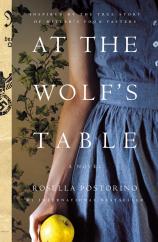At the Wolf's Table
Review
At the Wolf's Table
In an author’s note at the end of AT THE WOLF’S TABLE, author Rosella Postorino reveals the inspiration for her novel. She had learned about Margot Wölk, the last surviving woman whose job it was to taste Hitler’s food to test it for poison. Sadly, by the time she arranged to interview her, the elderly Wölk had died, leaving Postorino to imagine the story instead. The book that grew out of her imagination is simultaneously a fascinating character study and an intricate moral exploration of the impossible choices people make during wartime.
AT THE WOLF’S TABLE is narrated by Rosa Sauer, who, as we come to learn, is now an old woman, recalling the events of her youth. When Rosa is drafted into service for the Führer, she is in her mid-20s. She is living in the countryside with her in-laws after her husband, Gregor, is called away to the Russian front and her mother dies in a bomb blast in Berlin, which is where Rosa is from.
"Postorino’s empathy and imagination have served her well. Her novel not only reveals a lesser-known chapter of World War II history, it also offers an essential glimpse into life during wartime..."
Rosa and nine other females are assigned, three times a day, to eat the food that will eventually be served to Hitler, and then wait an hour to see what, if any, adverse reactions they might have. At first, the women --- who, like most Germans, are on the brink of malnutrition during the deprivations of wartime --- welcome the opportunity to eat three full and nourishing meals per day, even knowing the risk they might be taking (and despite Hitler’s mostly vegetarian diet, which they don’t understand).
Rosa feels herself somewhat separate from many of her fellow food tasters. Some of them are distrustful of her urban origins and wardrobe choices, which set her apart from the others. And some of the women --- dubbed the “Fanatics” by Rosa --- are utterly devoted to Hitler in a way that she can’t understand. Rosa’s loved ones were never Nazis or Nazi sympathizers, and for Rosa, the war and the hateful philosophy underlying it is something to be endured rather than embraced. But as the war drags on and she finds herself being drawn into the lives of the other women, and even of their SS supervisors, Rosa ends up making choices and allegiances that her pre-war self never could have imagined.
In a recent interview, Postorino mentions that before starting to write AT THE WOLF’S TABLE, she second-guessed her own authority to share what happened. As an Italian (rather than a German) author who never lived under a dictatorship, she wasn’t sure she could tell the story convincingly or authentically. Fortunately, Postorino’s empathy and imagination have served her well. Her novel not only reveals a lesser-known chapter of World War II history, it also offers an essential glimpse into life during wartime, especially how war affected the lives of ordinary women pressed to do extraordinary things --- even if that meant just sitting down to dinner.
Reviewed by Norah Piehl on February 1, 2019
At the Wolf's Table
- Publication Date: February 11, 2020
- Genres: Fiction, Historical Fiction
- Paperback: 288 pages
- Publisher: Flatiron Books
- ISBN-10: 1250179165
- ISBN-13: 9781250179166




